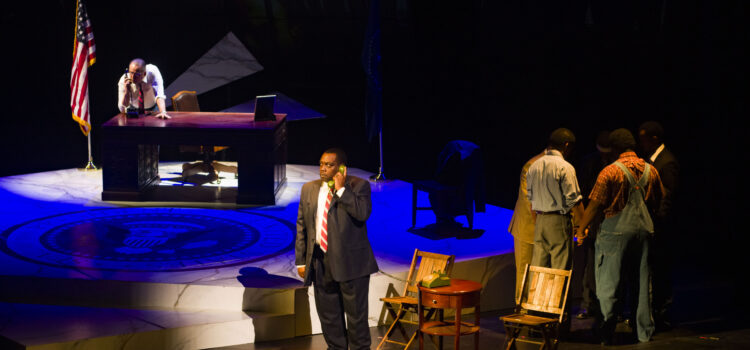By Lynn Venhaus
The movement is a rhythm to us
Freedom is like religion to us
Justice is juxtapositionin’ us
Justice for all just ain’t specific enough
–“Glory” by Common and John Legend
2015 Oscar winner for Best Song, from the movie “Selma”
A remarkable history lesson more so than a lecture, “Hold On!” features a powerhouse ensemble recreating a pivotal period in 1965 that was a clarion call then and eerily an alarm bell now.
The Black Rep honors Dr. Martin Luther King Jr.’s legacy with the timing of opening weekend to coincide with the federal holiday marking his Jan. 15 birthday, which has taken place on the third Monday of January every year since 1983.
King, the most prominent advocate for nonviolent activism to protest racial discrimination, helped get the Voting Rights Act signed by President Lyndon B. Johnson on Aug. 6, 1965, after convincing the president a year earlier to sign the landmark Civil Rights Act (July 2, 1964), the same year he was awarded the Nobel Peace Prize (Dec. 2, 1964).
Their fascinating relationship was at times contentious but also collaborative, and those power battles royale are embodied by Enoch King as resolute MLK and Brian Dykstra as salty LBJ.
Dykstra easily slips into playing the master politician Johnson, for he has appeared twice before in the role – but in the drama “All the Way” that was produced at the Repertory Theatre of St. Louis in fall 2015, which focuses on the civil rights endeavors in ’64, and as Brian Cox’s understudy in “The Great Society,” playwright Robert Schenkkan’s sequel, on Broadway in 2019
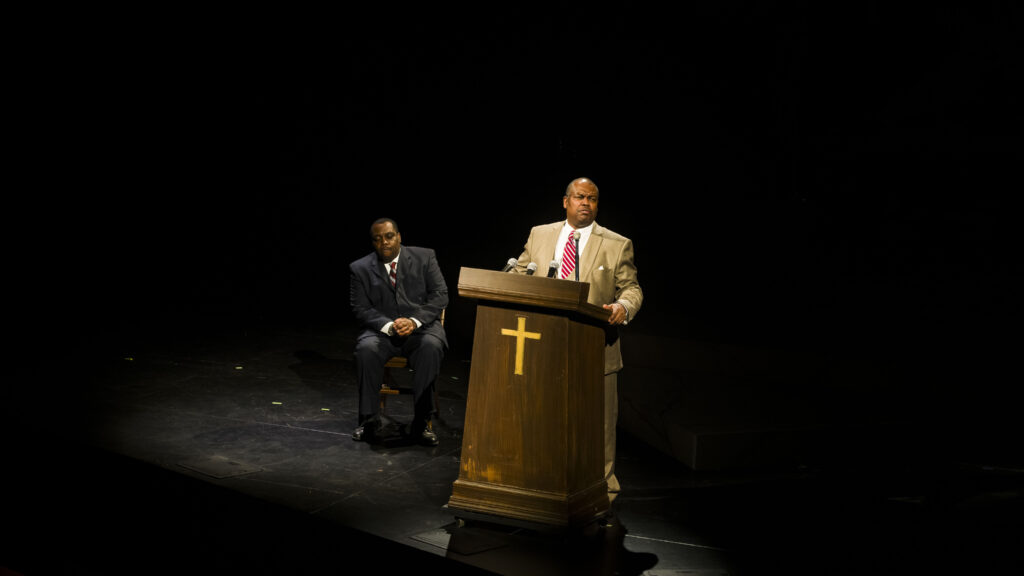
King is tenacious as the motivational visionary, remaining idealistic about moving people to action in divisive times. Both King and Johnson knew they couldn’t advance anything alone but needed supporters to be fervent about progress. The good reverend is a shrewd strategist in getting what he wants with the President, whose legendary battles with the “Dixiecrats” are well-documented.
While both were certainly flawed individuals, they were able to come together and change the course of America, pushing to outlaw discrimination based on race, color, religion, sex, and national origin.
On March 15, 1965, LBJ delivered a speech before Congress on voting rights — stating that the civil rights problems challenged the entire country, not one region. He asked for legislation that dictated clear, uniform guidelines for voting regardless of race or ethnicity, which would allow all citizens to register to vote free from harassment.
Through a turbulent lens, this sobering play looks back when blacks were being murdered in the South, just for daring to register to vote, use their voice to speak up and stand up, and the killers were not punished. These incidents still pack a gut-punch, and this drama, thriller-like, illuminates gathering storms, and as history prompts us, we must be vigilant.
In 1965, Selma represented the epicenter, and in Alabama, the struggle for justice and equality escalated. This well-researched historical work by Paul Webb depicts the drive for voting rights that resulted in the March 7 “Bloody Sunday” where protesters were beaten at the Edmund Pettus Bridge trying to march to Montgomery, the state capital.
Two weeks later, King, James Forman and John Lewis led marchers on that landmark trail after a U.S. District judge upheld the rights of demonstrators.
Webb, a British playwright and screenwriter who is credited with the screenplay for the 2014 film “Selma,” first began the project as a play, then moved forward instead with the film, but in the years since, has revised and finished his play. The Black Rep is the first company to produce it.
The Civil Rights Movement was a long and winding road, starting in 1954 and ending in 1968. Webb, fascinated by the motives of both Johnson and King during the 1964-65 period, has formatted the play as a series of vignettes, with 21 scenes, carried out by a cast of 14.
Ambitious, yes, and director Ron Himes deftly moves along characters and action, focusing on the urgency.
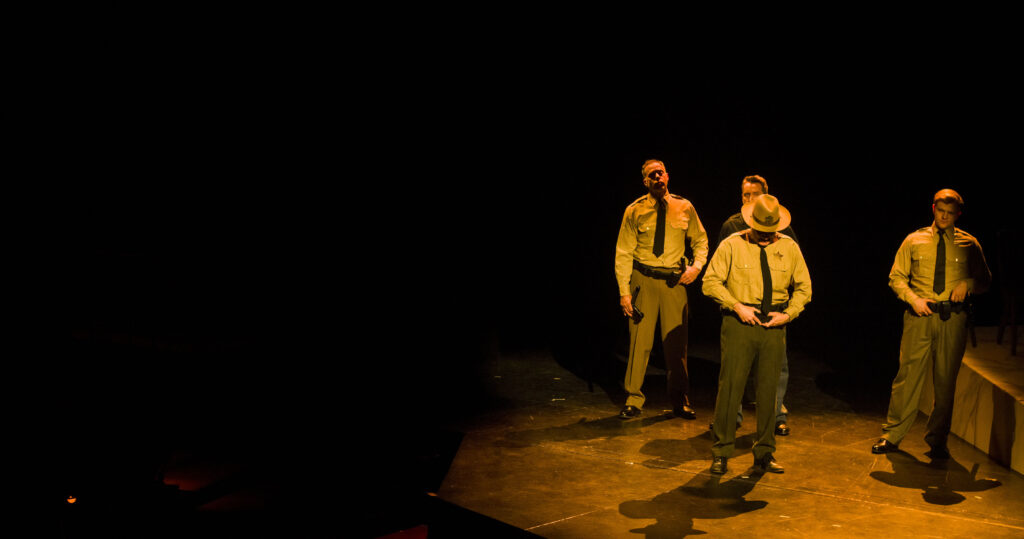
This true story has a lot of moving parts to convey onstage, establishing characters who figure prominently in the tumultuous days highlighted. Scenes are mostly divided between Selma, Atlanta (King’s residence), Brown Chapel and Washington D.C., where Dunsi Dai’s evocative scenic design includes the Oval Office as a focal point, and Meg Brinkley’s prop design conveys.
Because of the nature of a stage play, the action offstage is chronicled through news clippings and video reports, which projections designer Zach Cohn has astutely put together.
The play is dense at first, takes a while to gain momentum, but when it does, it’s riveting and empowering.
Those unfamiliar with this period may need a primer to know who the key players are. People alive then or who remember it from the history books may recall who Alabama Gov. George Wallace and Dallas County Sheriff Jim Clark are, both masterfully played as hot-headed intolerant bigots by Eric Dean White.
The segregationists were firmly entrenched in the power grid during the Jim Crow era, and the selective timeline deepens the storytelling,
Making an impression as racist Al Lingo of the Alabama Highway Patrol and heroic activists Jimmie Lee Jackson and Annie Lee Cooper are Jeff Cummings, Jason Little and Tamara Thomas, who also play another role each.
Little and Thomas are strong in their characterizations of ordinary citizens who represent how despicably treated minorities were – and you’ll remember those names.
Isaiah Di Lorenzo smoothly plays a cruel county courthouse registrar and a redneck state trooper in addition to presidential speech writer Richard N. Goodwin. Thomas Patrick Riley tackles three unflattering roles – the ignorant courthouse worker Leverne, and an unenlightened deputy and state trooper. Tammie Holland is posh as King’s fling Della.
Other dedicated performers resemble the real people of King’s inner circle so we don’t forget their contributions: Greg Carr Sr. as Ralph Abernathy, Olajuwon Davis as James Foreman, Greg Carr II as (future Congressman) John Lewis, Joel Antony as Hosiah Williams and Little doubling as Andrew Young (future Congressman, US Ambassador to the United Nations and Atlanta mayor).
These characters earned a place in history but perhaps are unknown to subsequent generations. (And if history is being rewritten in certain school districts…I digress).

For the play version, Webb laudably expanded the role of Coretta Scott King, and Evann DeBose is radiant –and assertive — as a woman working alongside her famous husband on the same goals, a strong force who won’t be diminished or treated callously.
Musically inclined, Coretta is shown singing and playing the piano (kudos to pianist Antonio Foster). DeBose’s soulful and heartfelt renditions of songs associated with the movement — Sam Cooke’s “A Change Is Gonna Come” from 1964 and “Keep Your Eyes on the Prize,” a folk song referencing Biblical passages, also known as “Hold On,” popularized in 1963, remain indelible. The rallying anthem “We Shall Overcome” had to be prominently featured and it is.
One of the highlights of this production is sound designer Lamar Harris’ original music score. His compositions vividly capture the moods and punctuate the action in a notable way.
Some of the horrifying attacks are choreographed movements to represent the explosive violence and shrouded in blue lighting by expert designer Sean M. Savoie. Annie Lee Cooper’s front-page-news punch to the sheriff is well-staged for optimum effect.
Costume designer Marc W. Vital II has put together appropriate vintage looks for the women and standard business attire for the men. Special recognition goes to stage manager Tracy D. Holliway Wiggins and assistant Alan Phillips for maintaining the flow of all the comings and goings, no easy feat.
It’s important to keep this story at the forefront today because of its relevancy to equal rights.
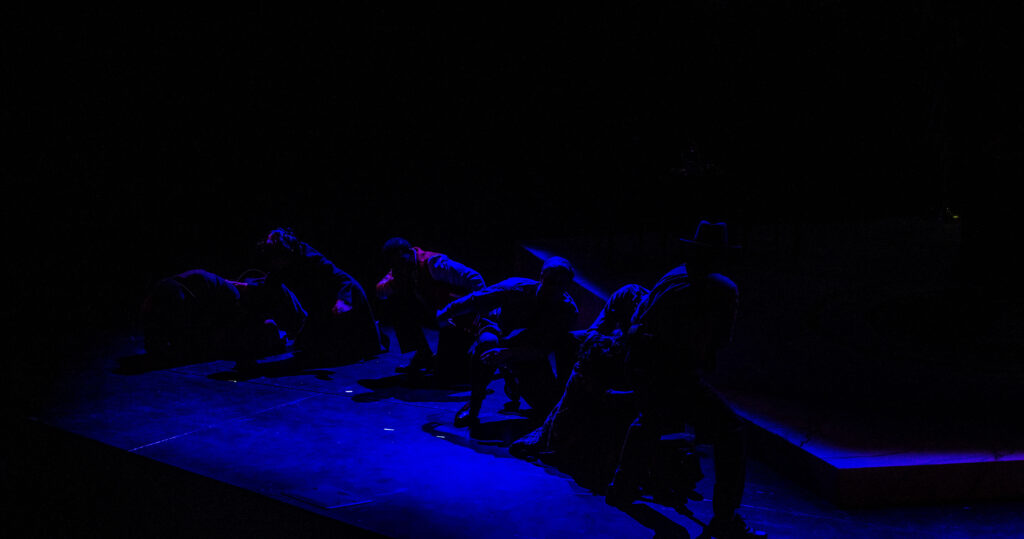
The shock of brutal attacks with prejudice and without accountability reminds us that we are again living in tense times and protections are not absolute. As far as we have come in 59 years, scary to even think suppression is happening again.
It’s difficult to wrap one’s head around that more than 60 years ago, people died for the right to vote, and as I write this, voting rights are being threatened. However, a movement is underway supporting the Freedom to Vote Act of 2021 and the John Lewis Voting Rights Advancement Act of 2023, which would modernize and revitalize the 1965 Voting Rights Act, strengthening legal protections against discriminatory voting policies and practices. Maybe “Hold On!” will be a timely nudge in the right direction.
“Hold On!” is a fine example of people keeping their eye on the prize, illustrating how many marched away from the darkness and into the light because of King’s special skills, and those he passed the torch to during his lifetime and beyond. It’s a refresher course on Selma not being a bridge too far.
Facin’ the league of justice, his power was the people
Enemy is lethal, a king became regal
Saw the face of Jim Crow under a bald eagle
The biggest weapon is to stay peaceful
We sing, our music is the cuts that we bleed through
Somewhere in the dream we had an epiphany
Now we right the wrongs in history
No one can win the war individually
It takes the wisdom of the elders and young people’s energy
One day when the glory comes
–“Glory”
The Black Rep presents the world premiere of “Hold On!” Jan. 10-Jan. 28 with performances Wednesday-Thursday at 7 p.m., Friday-Saturday at 8 p.m. and Sundays at 3 p.m. Performances take place Jan. 10-28. Tickets are $50, or $45 for seniors and $20 for students (17+), with student rush tickets $15. No one aged 5 and under is admitted. Season 47 subscriptions are available. Tickets can be purchased at the Edison Theatre box office; the Black Rep’s box office, 813 N. Skinker Blvd.; or by calling 314-534-3810. For more information, visit: www.theblackrep.org
Cinema St. Louis is pleased to partner with the St. Louis Black Repertory Company for a special screening of the film, “Selma,” on Saturday, Jan. 20, at the Hi-Pointe Theatre at 1 pm. General Admission Tickets are $10, and a discounted ticket of $8 is available for current students and senior citizens aged 55+.” Visit site for tickets: https://www.cinemastlouis.org/selma-screening-black-rep
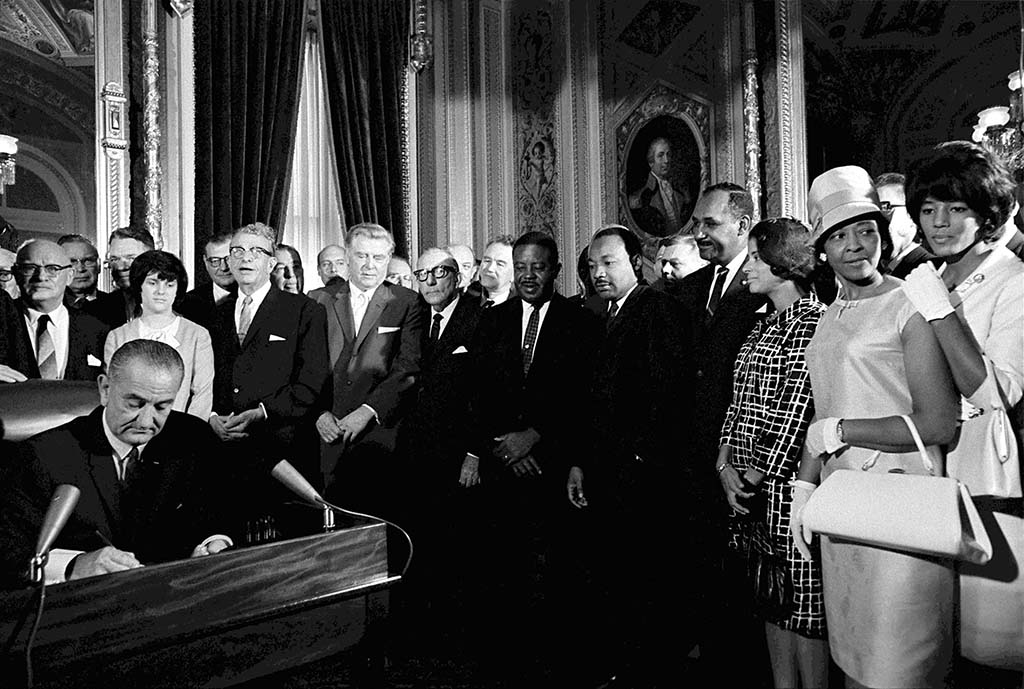

Lynn (Zipfel) Venhaus has had a continuous byline in St. Louis metro region publications since 1978. She writes features and news for Belleville News-Democrat and contributes to St. Louis magazine and other publications.
She is a Rotten Tomatoes-approved film critic, currently reviews films for Webster-Kirkwood Times and KTRS Radio, covers entertainment for PopLifeSTL.com and co-hosts podcast PopLifeSTL.com…Presents.
She is a member of Critics Choice Association, where she serves on the women’s and marketing committees; Alliance of Women Film Journalists; and on the board of the St. Louis Film Critics Association. She is a founding and board member of the St. Louis Theater Circle.
She is retired from teaching journalism/media as an adjunct college instructor.

